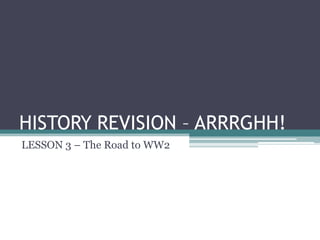
History Revision 3 Road To Ww2
- 1. HISTORY REVISION – ARRRGHH! LESSON 3 – The Road to WW2
- 2. The Road to WW2 Summary This is a PAPER 1 topic for your exam on 3rd June. You will need to revise the following: 1. Hitler’s aims 2. Chamberlain and Appeasement 3. The Nazi-Soviet pact
- 3. Hitler’s Aims It is easy to blame Hitler for starting the war. Hitler's aims were aggressive, and he openly stated them in his book quot;Mein Kampfquot; in 1924: 1. Destroy the Treaty of Versailles. 2. Create a Greater Germany (a country of all the German people). 3. Lebensraum (living space) to conquer land for Germany in Eastern Europe. Once he came to power, Hitler set about doing exactly what he had said he would do. For each of his actions between 1935 and 1939, can you see which aim(s) he was fulfilling by undertaking: 1935 - Rearmament 1936 - Remilitarisation of the Rhineland 1938 - Anschluss with Austria 1938 - The annexation of the Sudetenland 1939 - The invasion of Czechoslovakia 1939 - The invasion of Poland
- 4. Reasons for appeasement There were many reasons why Chamberlain appeased Hitler, but here are the main ones: 1. The British people wanted peace - they would not have supported a war in 1938. 2. Many of Hitler's complaints appeared reasonable at the time - especially about the Treaty of Versailles. 3. Chamberlain wanted a strong Germany to serve as a barrier against expansion by communist Russia. 4. Britain's armed forces were not ready for a war, and they could not have helped Czechoslovakia anyway. 5. Many people admired Hitler. In 1938, the American magazine 'Time' declared him 'Man of the Year'. 6. Chamberlain remembered the slaughter of the First World War; he thought another war would destroy civilisation.
- 5. Results of appeasement At Munich, 30th september 1938 - France and Britain agree to give Hitler the Sudetenland. Chamberlain waves 'a piece of paper' with Hitler's statement that he does not want to go to war: 1. Czechoslovakia was weakened. Poland and Hungary took other land. 2. Britain gained a year to build up its armed forces, but so did Hitler. 3. Hitler decided that Britain and France were afraid of him, and that they would not stop him whatever he did. 4. Russia decided that Britain and France would never stand up to Hitler, and that war with Germany was inevitable. 5. The people of Britain realised that they had been duped, and decided that war was inevitable. 6. It improved the war morale of the British people, who knew they had done everything possible to avoid war.
- 6. Nazi-Soviet Pact Everybody realised that Hitler's next target was Poland, so Chamberlain promised to defend Poland. But how? Britain was too far away to help and only had a small army. In April 1939, Stalin suggested an alliance of Russia, France and Britain against Germany. Hitler would not have been able to invade Poland if taking that action would have meant war with Russia. However, negotiations dragged on into August because: 1. Chamberlain did not like communist Russia. 2. Poland would not let Russian troops go into Poland. 3. Stalin did not trust that France and Britain would resist Germany. Out of the blue, on 23 August 1939, Hitler made the Nazi-Soviet Pact with Stalin - a promise not to go to war with each other and (secretly) a promise to invade Poland and split it between them.
